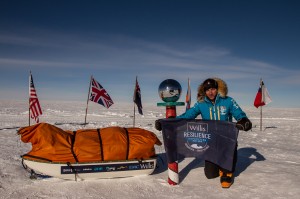
In December, Geology & Geophysics major Parker Liautaud (DC ’16) set a world record by completing the fastest Antarctic coast-to-pole trek. In 18 days, he became the youngest man to trek to the South Pole without assistance. And while his record transit time attracts the most press, the focus of Liautaud’s journey was three separate scientific projects that reflect his commitment to geoscience and climate change issues.
Liautaud has been interested in climate science since he was young, and has completed four polar expeditions since turning 15. Over time, his trips have shifted to focus more heavily on science; In this expedition, he was directly involved with an advisory board of scientists and experts.
Liautaud began his December trek with a coast-pole-coast transit of roughly 1,200 miles, and then completed a 350-mile race to the pole. On the first crossing, Liautaud tested a new Antarctic weather station and conducted isotope sampling in layers of Antarctic snow. “We did the science first and the speed attempt afterwards,” Liautaud said. “Doing them both at the same time would have compromised one at the expense of the other.”
The first of Liautaud’s projects was testing a cheaper, lighter Antarctic weather station that could be deployed in 15 minutes. Antarctica’s existing weather stations are expensive and difficult to maintain, and improving the precision of Antarctic meteorology requires a cheaper, more fail-safe station network.
A second component of Liautaud’s expedition was a coast-pole-coast sampling survey of the stable isotope composition of Antarctic snow. The isotope composition of at different depths provides important information for reconstructing climate history.
Samples collected relatively close to the surface provide information on a more recent timescale, and give a detailed picture of Antarctic precipitation. Liautaud sampled shallow cores drilled two meters deep, gathering information that can improve the understanding of recent temperature and snow accumulation patterns.
Liautaud’s third project involved the study of tritium, a radioactive isotope of hydrogen with a half-life of 12.3 years. Tritium is produced at an extremely low constant rate by the interaction of cosmic rays with Earth’s atmosphere. It was released in disproportionately high quantities during war-era nuclear bomb testing, but now its deposition has returned to natural levels.
Tritium is useful for accurately dating snow samples across Antarctica from the past 100 years. Understanding the factors influencing natural tritium deposition could improve tritium dating techniques. “With the tritium project, we were not using tritium dating, but trying to refine its technique by learning about the context of tritium deposition,” Liautaud explained. “Though it’s not particularly glamorous, this project will generate new information to make tritium even more useful in studying the Antarctic climate.”
Liautaud sampled tritium concentrations in order to study its dependence on geographical conditions. The samples he obtained will help reveal a trend in tritium variability that can be used to solidify the usefulness of tritium dating in Antarctica. Liautaud will participate via Skype in the analysis, which is being conducted in New Zealand by the world’s most accurate tritium lab.
The combination of lab and field work is one of Liautaud’s favorite aspects of geoscience. “Field work can take you anywhere, and unexpected things happen all the time. It’s a constantly exciting and challenging process,” Liautaud said. “There’s a flipside, of course,” he added, citing the time Chilean customs confiscated an ice auger. “But where there are new challenges to be addressed, there are consistently new opportunities to be created.”
In the future, Liautaud plans to continue making scientific expeditions and to attend graduate school. As a strong advocate for improving climate and communication and policy, he has also worked with the Yale Climate and Energy Institute. “Climate change needs to be addressed, and public understanding is lacking,” Liautaud said, While he appreciates President Obama’s recent climate initiatives, Liautaud believes that we can and should do even more. “By the time people realize the effects, it will be too late. We need to act now to improve the way climate science is communicated.”
